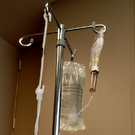ASCO Updates Recommendations For Use Of Medications To Prevent Blood Clots In Myeloma Patients – Experts from the American Society of Clinical Oncology (ASCO) recently updated their clinical practice guidelines on the prevention and treatment of blood clots in cancer patients. The guidelines recommend that multiple myeloma patients who are receiving Revlimid (lenalidomide) or thalidomide (Thalomid) with chemotherapy or dexamethasone (Decadron) should receive medication to prevent blood clots. Specifically, those who are at low risk of developing …
Read the full story »

Findings from a recent Phase 2 clinical study of a multiple myeloma vaccine indicate that the vaccine deepens responses following autologous stem cell transplantation.
Almost half of the patients in the trial achieved a complete response and almost another third achieved a very good partial response after vaccination.
The investigators state that these response rates compare favorably to initial therapy with Revlimid (lenalidomide) or Velcade (bortezomib) followed by stem cell transplantation.
Based on their results, the …
Read the full story »

This year’s American Society of Clinical Oncology (ASCO), which was held in Chicago, began on Friday and concluded on Tuesday.
Monday was the busiest day at the meeting with regard to myeloma research. It featured a session of oral presentations in the morning and a poster session in the afternoon.
This update summarizes the myeloma-related studies presented during the afternoon poster session, which was the final myeloma-related session of the meeting. An earlier article covered the findings from the …
Read the full story »

Findings from a recent analysis show that autologous (own) stem cell transplantation became significantly more common among North American multiple myeloma patients between 1994 and 2005.
During that period, the rate of autologous stem cell transplantation across all myeloma patients increased fivefold, driven by a twentyfold increase in the number of transplants carried out in myeloma patients as part of their initial therapy.
The findings also show that short-term overall survival for myeloma patients who received transplants increased significantly during …
Read the full story »

In a recent review article published in the journal Clinical Cancer Research, two myeloma experts from the Dana-Farber Cancer Institute, Dr. Nikhil Munshi and Dr. Kenneth Anderson, review the latest strategies in the treatment of multiple myeloma.
In their article, the experts discuss newer therapies that appear to be promising in clinical and preclinical studies.
According to the physicians, combination therapies that specifically target a patient’s genetic form of the disease will be required for long-term disease control and ultimately …
Read the full story »

A subanalysis of recent clinical trial results shows good response rates for single-agent Kyprolis in heavily pretreated multiple myeloma patients with high-risk chromosomal abnormalities.
Specifically, the investigators found that the response rates for patients with high-risk chromosomal abnormalities were similar to those for patients without high-risk chromosomal abnormalities.
However, the researchers also found that response duration and overall survival remained significantly lower in patients with high-risk chromosomal abnormalities.
Nevertheless, the researchers describe the results as encouraging, and they suggest that …
Read the full story »

Results from a recent European Phase 3 clinical trial indicate that a few months of treatment with Velcade may improve the outcomes of multiple myeloma patients who recently underwent a stem cell transplant.
Specifically, patients who received Velcade (bortezomib) following transplantation, which is known as “consolidation therapy,” had a longer median progression-free survival than those who did not receive additional therapy after transplantation. Their response to transplantation was also more likely to improve with Velcade consolidation therapy.
However, …
Read the full story »

